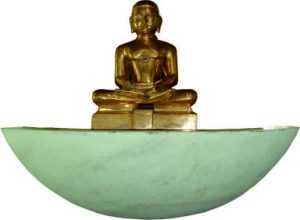Buddhist Scriptures

There are references in Buddhist books to acknowledged doctrines of Jaina theology, Metaphysics and ethics, for example :
1. A reference to cold water possessing a soul (i.e. to jivas, or souls, of the jala-kaya) in the commentary on the Brahmajala Sutta of the Digha Nikaya.
2. A reference in the same work to the Jaina rejection of the Ajivaka doctrine that the soul has colour.
3. A reference in the Samannaphala Sutta of the same Nikaya to the four vows of Parsvanatha. This is of special importance, as showing that the Buddhists were also aware of the older tradition of the Jainas with regard to the time and teachings of Parsvanatha.
4. A reference in the Majjhima Nikaya (56) to the conversion of upali. A lay disciple of Mahavira after a dispute with the Buddha as to the comparative iniquity of the sins of the body and the mind.
5. A reference in the same work (56) to the three sorts of dandas `hurtful acts’, namely, of body, speech and mind, in which the Jainas believe.
6. In the Anguttara Nikaya (iii 74) Abhaya, a prince of the Lichchhavis of Vaisali, refers to the Jaina affirmation of ability to attain full knowledge and to annihilate kaemas, old and new, by means of austerity.
7. A reference in the same Nikaya (iii 70.3) to the Dig-virati vow and the Uposatha day. The Dig-virati vow is `I shall go noly in certain fixed directions today.” Uposatha is keeping a fast in which the layman is supposed to be in his thought and behaviours like an ascetic.
8. In the Maha-Vagga (vi 31) Siha, the general of the Lichchhavis, and a lay disciple of Mahavira, goes against his master’s prohibition, to see the Buddha, and is converted by him on being taught the akriyavada doctrine of Buddhism, which made him relinguish the Jaina doctrine of kriya vada, inclucating a belief in soul, in the world, and in action (believed to by our own, either by performing it, our having it performed, or by our allowing it to be performed.)
9. Indirectly also to the Buddhist records attest the importance and probable high antiquity of Jainism.
10. They mention the Jainas (Nirgranthas) as opponents of converts of the Buddha, and never imply, much less assert, that they are a newly founded sect.
11. Makkhali Gosala divided mankind into six classes of which the third is the Nirgranthas. A new sect could not have held such an important place in a division of mankind.
12. The Buddha had a dispute with sachchaka, who was a non Nirgrantha son of a Nirgrantha father. This also proves decisively that the Jainas are not an offshoot of Buddhism.
Nayabindhu, the Buddhist work on logic
Yataha Sarvajna Aptova sa Jyothijnanathika Mupathisatva Yatha Rishabha Vardhamanaridhi.